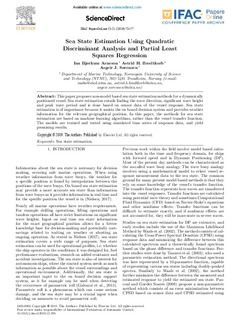| dc.contributor.author | Arneson, Ina Bjørkum | |
| dc.contributor.author | Brodtkorb, Astrid H. | |
| dc.contributor.author | Sørensen, Asgeir Johan | |
| dc.date.accessioned | 2020-01-10T13:15:32Z | |
| dc.date.available | 2020-01-10T13:15:32Z | |
| dc.date.created | 2019-12-11T14:44:55Z | |
| dc.date.issued | 2019 | |
| dc.identifier.issn | 2405-8963 | |
| dc.identifier.uri | http://hdl.handle.net/11250/2635726 | |
| dc.description.abstract | This paper proposes non-model based sea state estimation methods for a dynamically positioned vessel. Sea state estimation entails finding the wave direction, significant wave height and peak wave period and is done based on sensor data of the vessel response. Sea state estimation is of importance because it assists the on board decision system and provides weather information for the relevant geographical position. In this paper, the methods for sea state estimation are based on machine learning algorithms, rather than the vessel transfer function. The models are trained and tested using simulated time series of response data, and yield promising results. | nb_NO |
| dc.language.iso | eng | nb_NO |
| dc.publisher | International Federation of Automatic Control (IFAC) | nb_NO |
| dc.title | Sea State Estimation Using Quadratic Discriminant Analysis and Partial Least Squares Regression | nb_NO |
| dc.type | Journal article | nb_NO |
| dc.type | Peer reviewed | nb_NO |
| dc.description.version | publishedVersion | nb_NO |
| dc.source.volume | 52 | nb_NO |
| dc.source.journal | IFAC-PapersOnLine | nb_NO |
| dc.identifier.doi | 10.1016/j.ifacol.2019.12.285 | |
| dc.identifier.cristin | 1759382 | |
| dc.description.localcode | © 2019, IFAC (International Federation of Automatic Control) Hosting by Elsevier Ltd. | nb_NO |
| cristin.unitcode | 194,64,20,0 | |
| cristin.unitname | Institutt for marin teknikk | |
| cristin.ispublished | true | |
| cristin.fulltext | postprint | |
| cristin.qualitycode | 1 | |
